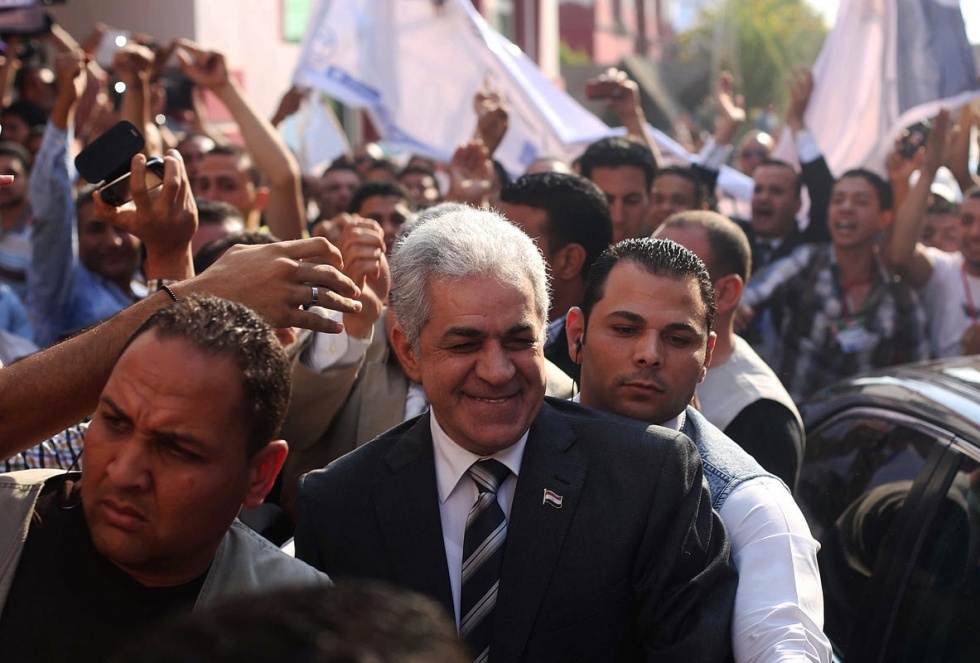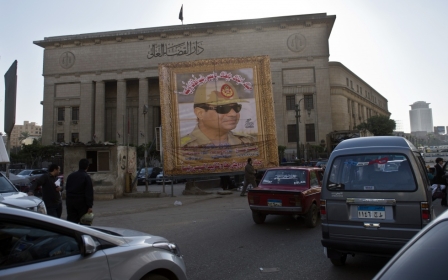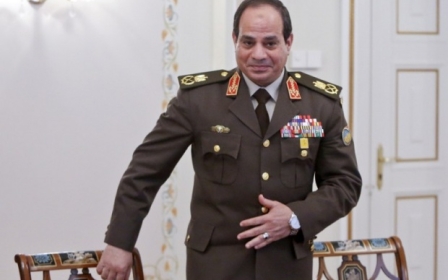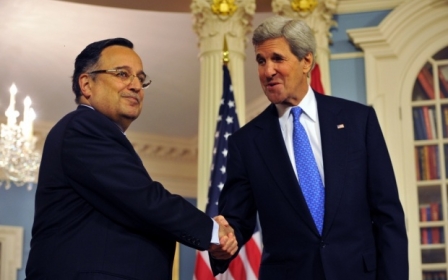Profile: Hamdeen Sabbahi - Egypt’s other candidate

Hamdeen Sabbahi’s campaign for presidential elections that will start in Egypt on Monday began just four weeks before the vote. During this time, he has traveled tirelessly across the country with a caravan of young supporters and staff, speaking in everywhere from weddings and union halls to town squares and weather-beaten industrial zones.
Through this hard campaigning, Sabbahi has cemented his reputation as a streetwise, grassroots politician among his fervent support base. However, few expect it will be enough to mount a credible challenge to former army chief Abdel Fattah al-Sisi.
Born in Baltim, a small farming town near Alexandria, Sabbahi came of age in the era of presidents Anwar Sadat and Hosni Mubarak. The son of a farmer, he spent his childhood among Egypt’s fellahin (peasants, farmers or fisherman), an experience that still influences his politics.
Sabbahi’s career as a political agitator began during his education at Cairo University. There, Sabbahi became involved in Nasserism, a political school of thought based in socialism, pan-Arab unity, centralized government and economy. After Sabbahi joined Egypt’s student union, he appeared on a famous televised debate in the late 1970s between his fellow student leaders and Sadat.
After lambasting Sadat for his economic policy and purportedly Western-leaning political dealings, Sabbahi was quickly banned from working in state media and his notoriety began. In the ensuing decades, Sabbahi has been jailed 17 times for political activity. During the 1990s, Sabbahi was forced out of the Nasserist party and he later co-founded the Karama or “Dignity” party. He remains a member.
New MEE newsletter: Jerusalem Dispatch
Sign up to get the latest insights and analysis on Israel-Palestine, alongside Turkey Unpacked and other MEE newsletters
Grassroots tactics
Sabbahi draws much of his credibility and campaign strategy from his upbringing. His campaign slogan, “One of us”, has helped him solidify his reputation as an everyman politician. “He’s supporting the poor and he really feels about the Egyptian suffering, he’s someone that lives like us, and we live like him,” said Asmaa Sharif, a volunteer with Sabbahi’s campaign.
According to Sabbahi’s campaign managers, he went to Tahrir Square during the first days of the early 2011 uprising against Mubarak’s rule, staying among other protestors until police began to crack down on the square and sustaining minor injuries in the process.
“We need to fix education, we must have freedom of speech. Now many have died, and they are not a part of the Brotherhood, and we need to fix that as well,” Sabbahi told the MEE.
Sabbahi’s history of revolutionary activity has drawn in many young people disappointed by the political trajectory of the country since the overthrow of Mubarak. “He’s the only one left from the revolution," said Hossam, a driver from Matariya - another of Sabbahi’s campaign slogans is “We will continue our dream”, a reference to the January 25th Revolution, according to campaign staff.
“Young people are basis of the revolution and, without the youth, there is no future for the country. Most of the people who support Sabbahi are young. I believe that this is for the country’s good,” said Hassan Shahin, a co-founder of Tamarod, the now fracturing protest movement that was influential in the ouster of former president Mohamed Morsi.
In running his campaign, Sabbahi has tried to combat the monolithic force of Sisi’s campaign through grassroots tactics, door-to-door campaigning, and personal visits to his constituency. However, Sisi’s campaign has considerably more resources and financial support and is riding a wave of public support for the military following Morsi's ouster last July.
The majority of Egyptian businessman and local figures believe Sisi will win the presidency and, jockeying for positions within his regime, have poured money in and drummed up support for the Sisi campaign.
Sisi’s fervent supporters travel throughout Cairo, spray-painting “CC” and plastering his likeness in public spaces. His reported campaign budget of $1.6 million has allowed him to install billboards and air nationwide television commercials. According to campaign staff, Sabbahi is running his campaign on a budget of roughly $31,000.
Private media has been uncooperative with the Sabbahi campaign. “Both Sisi and Sabbahi were granted 14 minutes of speech on State television. But Sabbahi has been constantly rejected by private TV," said Adel Ahmed, a campaign organiser.
Sisi has yet to appear publicly since his campaign started. At a recent rally in Cairo, many in attendance admitted to being driven into the city from rural areas and paid to attend. Meanwhile, Sabbahi has to rely on volunteer campaigners, celebrity spokespeople like actor Amr Wakkad, local political leaders, and rapid tours of the Egyptian hinterland to create a support base.
'Integrated solutions'
Egypt’s rising insurgency and economic troubles have risen to the forefront of the country’s issues for voters. “For terrorism in Egypt, we need to have an integrated solution, not just for the security impact. We need to fix education, we must have freedom of speech," Sabbahi told The Middle East Eye.
Since the summer crackdown on the Muslim Brotherhood, acting president of Egypt Adly Mansour and Sisi have drawn criticism from human-rights organizations and politicians for the rate in which Egyptians are being incarcerated for political activity, charges of “terrorism” or belonging to a terrorist organization.
Initially, Sabbahi voiced support for Sisi’s campaign to eradicate the Muslim Brotherhood and hence was also condemned from human-rights groups. Now, he says, to combat terrorism, “We need to fix education, we must have freedom of speech. Now many have died, and they are not a part of the Brotherhood, and we need to fix that as well.”
Supporters of Sisi expressed concern that Sabbahi would be able to penetrate Egypt’s strong, secretive, and unruly military. “Sabbahi has a strong personality but Sisi’s is stronger. He is a state man, Sabbahi is from the street, and we can’t have that in politics," said Mohamed Shabrawy from Mansoura, who was attending a Sabbahi rally.
Many of those attending Sabbahi rallies expressed a desire for Egypt’s military to take a backseat in the political arena. Campaigners, Ahmed the campaign organiser explained, try to promote the idea that Sabbahi is a civilian candidate, and not a part of the “deep state” or military. “We respect army and military institutions and we believe it has to do its own job for national security, and not to be any part of any election or a party’s campaign. It has to protect and not to lead," Sabbahi said.
In addition to his absence from all campaign activities, Sisi has yet to explicitly explain what his overall strategy, as president of Egypt, would be. Sabbahi, however, has released a 70-page plan for his presidency. ”We need to bring back a national sector of Egyptian products. We have five million small projects planned for young people, to create a good climate to encourage Arab and foreign factories to come to Egypt," he said.
Going through the motions?
Despite his support base and tireless campaign efforts, most believe the mass support for Sisi will trump any of his efforts. “Everyone, I think, agrees that the campaigning phase of this election is a charade. We all know the outcome already. It’s just a matter of going through the motions” said Tarek Radwan, the associate director at the Rafik Hariri Center for the Middle East at the Atlantic Institute.
“All the secular political parties, liberals, leftist and so forth, I think they cannot really compete with Sisi and those who are considering running for the presidency," said Michele Dunne, a senior associate at the Carnagie Endowment for International Peace.
For his supporters, many of whom were dismayed by Egypt’s past three years of political strife, Sabbahi is a source of hope, progress, and change. “We dream of this man, we dream of justice”, said Abu Nassar an engineer from Mansoura.
Others, like Sarwat, a waiter at a banquet hall where Sabbahi held a conference, have little hope for a different future. “I’m supporting no one," he said. "Sometimes people start out one way, but they always end another way.”
Middle East Eye delivers independent and unrivalled coverage and analysis of the Middle East, North Africa and beyond. To learn more about republishing this content and the associated fees, please fill out this form. More about MEE can be found here.




